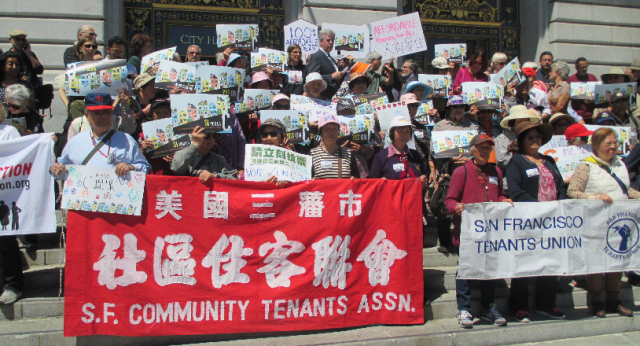The State Assembly may vote as early as Monday on a bill that would give real estate developers a huge windfall at the expense of tenants, small businesses, and neighborhoods.
Gov. Jerry Brown is supporting the measure, which would exempt developers from local zoning and land use policies of if they building apartments or condos that includes potentially miniscule amounts of affordable housing.

The measure could have a profound impact on cities like San Francisco, turning great swaths of land over for luxury housing with absolutely zero local control. It’s one of the most dangerous bills for tenants, neighborhoods, and affordable housing that we’ve seen in years, and would lead to dramatically increased displacement of vulnerable communities.
Yet it has received little press coverage – and very little in the way of outspoken opposition from Bay Area political leaders.
AB2501, by Assemblymember Richard Bloom (D-Santa Monica) is the equivalent of the Ellis Act for zoning laws – it trumps local laws for real estate speculators and developers under the guise of benefiting people who need housing.
On the surface, AB2501 merely tweaks the already hyper-technical language of the state’s existing “density bonus” law. That state law gives developers the option to apply to city planning departments to build housing developments that are taller or more dense (i.e., with more housing units) than local law allows.
In exchange for an exception or concession from local law, developers must build between five and ten percent of the housing at prices affordable to low or moderate income households – a more modest version of the mandatory inclusionary housing requirement that San Francisco imposes on all new medium and large scale housing developments.
The state density bonus has been on the books for years and done little to produce affordable housing. Instead of trying a different strategy (such as adopting a mandatory statewide inclusionary policy, or allocating more state money for affordable housing) state legislators and now the governor are blaming local governments for the failure of the density bonus policy and more generally for the housing crisis.
This is an element of truth to this criticism. So-called Nimby exclusionary zoning practices are widespread. But the larger reality is that land owners and builders are not lacking in places to build. Cities could decide that some of those sites should be something other than luxury housing, particularly when two-thirds of existing Bay Area residents can’t afford market-rate units.
The problem is that the building and real-estate industries have a huge lock on California politics. Those groups spend a fortune on campaign contributions and lobbying – and the largesse goes to both parties. So now, with the support of the Realtors and California Apartment Association, Democrats in the Assembly have come up with AB2501.
In a nutshell, AB2501 would give developers a free pass to demand exemptions from local law. For every five-to-ten percent increment of affordable housing in a development, developers would get one free pass for a concession or exemption from local zoning or land use law. According to the California Chapter of the American Planning Association, the bill would:
“allow a developer who provides as little as 5% affordable housing units to get any incentive, concession, or waiver from zoning or development standard he or she asks for without providing any justification whatsoever for the request.”
The legislation is not specific about what local laws can be bypassed– but typically these are described as height limits, reductions or elimination of back yards, and density and size of units. But creative developers could seek waivers of laws protecting small businesses, regulating condominium conversions, and beyond.
It would take much planning out of the hands of local planning commissions, city councils, and board of supervisors.
The measure would also create strict time limits for city planners to approve project proposals or to identify specific changes that would be required to comply with the law. Failure to meet the time lines would result in the automatic approval of the entire project. Disgruntled developers could sue the city and then require the city to pay for their attorney’s fees.
AB2501 would further ties the hands of cities and the public by prohibiting public agencies from asking for additional reporting or analysis of a project. The narrowing of a city government’s ability to review and require improvements of a proposal would have a direct and adverse impact on the public’s ability to control real estate development in their communities.
Supervisors Aaron Peskin and Jane Kim introduced a resolution at the Board of Supervisors to urge that AB2501 be amended to provide for an exemption for cities that are building more affordable housing than the state density bonus law would yield. If the legislation were targeted at cities that excluded affordable housing, logically the law should exempt those cities that do the opposite. That measure passed without opposition.
Peskin requested but has been unsuccessful arrangement a meeting with Assemblymember Bloom. And thus far, neither of San Francisco’s representatives in the Assembly, Phil Ting or David Chiu have offered to introduce the amendment. Chiu voted in favor of the AB2501 in committee with minor amendments. Ting hasn’t taken a position.
When the Ellis Act passed, a lot of local officials, and even SF’s representatives in Sacramento, downplayed the threat, saying the measure wasn’t that big a deal. It’s turned out to be one of the worst nightmares tenants have ever seen, a massive attack on affordable housing in cities like SF.
This is in the same league – and if it isn’t stopped soon, it could be too late.






